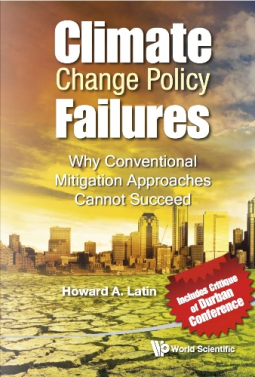
Climate Change Policy Failures
Why Conventional Mitigation Approaches Cannot Succeed
by Howard A. Latin
This title was previously available on NetGalley and is now archived.
Buy on Amazon
Buy on BN.com
Buy on Bookshop.org
*This page contains affiliate links, so we may earn a small commission when you make a purchase through links on our site at no additional cost to you.
Send NetGalley books directly to your Kindle or Kindle app
1
To read on a Kindle or Kindle app, please add kindle@netgalley.com as an approved email address to receive files in your Amazon account. Click here for step-by-step instructions.
2
Also find your Kindle email address within your Amazon account, and enter it here.
Pub Date Jul 14 2012 | Archive Date Nov 01 2012
Description
At the recent UN Climate Change Conferences in Copenhagen, Cancun and Durban, the developed nations promised hundreds of billions of dollars in financial aid to help developing countries overcome global climate change dangers. The developed nations will need to spend many more billions to limit their own greenhouse gas pollution, the main cause of global warming and climate change. Will all this money and effort be wasted? This book argues that nearly all of the world's climate policy makers and expert advisors have been making tragic mistakes that ensure the failures of climate change mitigation attempts.
The great majority of climate change programs, from American congressional bills to cap-and-trade economic incentive schemes to the Kyoto Protocol and other international treaties, rely on greenhouse gas emissions-reduction targets that will prove "too little, too late" by deferring strict pollution controls too far into the future. The inadequate emissions-reduction measures also will not be able to bridge the gap between the highest priorities of developed and developing nations. Vast discharges of greenhouse gases authorized by weak emissions-reduction programs in the next several decades virtually guarantee that the cumulative concentration of greenhouse gases in the atmosphere will keep increasing while climate change continues to grow worse.
Rather than adopting ineffectual emissions-reduction programs that cannot limit the cumulative concentration of greenhouse gases in the air, this book proposes a shift to a "clean" technology-replacement strategy that could support current lifestyles and expanding economic development without further damaging our climate. The only way to reduce the greenhouse gas levels in the atmosphere enough to decrease climate change hazards is to replace large pollution sources as rapidly as feasible in as many industrial sectors and geographic regions as possible with "clean" alternative technologies, processes, and methods.
The great majority of climate change programs, from American congressional bills to cap-and-trade economic incentive schemes to the Kyoto Protocol and other international treaties, rely on greenhouse gas emissions-reduction targets that will prove "too little, too late" by deferring strict pollution controls too far into the future. The inadequate emissions-reduction measures also will not be able to bridge the gap between the highest priorities of developed and developing nations. Vast discharges of greenhouse gases authorized by weak emissions-reduction programs in the next several decades virtually guarantee that the cumulative concentration of greenhouse gases in the atmosphere will keep increasing while climate change continues to grow worse.
Rather than adopting ineffectual emissions-reduction programs that cannot limit the cumulative concentration of greenhouse gases in the air, this book proposes a shift to a "clean" technology-replacement strategy that could support current lifestyles and expanding economic development without further damaging our climate. The only way to reduce the greenhouse gas levels in the atmosphere enough to decrease climate change hazards is to replace large pollution sources as rapidly as feasible in as many industrial sectors and geographic regions as possible with "clean" alternative technologies, processes, and methods.
Available Editions
| EDITION | Hardcover |
| ISBN | 9789814355643 |
| PRICE | $29.95 (USD) |
| PAGES | 268 |



